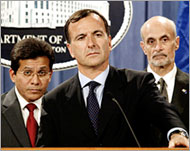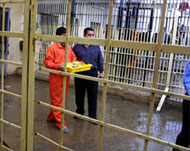Untitled Document
 |
Franco Frattini said states
could lose voting rights in the EU |
Any European Union state that secretly hosted a CIA prison faces loss
of its voting rights, and Washington should punish any violations that occurred,
an EU commissioner says.
Franco Frattini, commissioner for justice, freedom and security, on Monday said
that under EU law, if reports of secret CIA jails were true, states would face
"serious consequences, including the suspension of the right to vote in
the council".
Frattini told a news conference he would be obliged by EU treaties to recommend
the suspension to the council, which brings together ministers of the 25 member
countries and is the bloc's main decision-making body.
The comments were his most explicit on the implications for any country found
to have been host to a secret CIA prison for interrogating terrorism suspects.
A suspension of voting rights for a member country would take the EU into uncharted
territory.
It would require the unanimous backing of all the other member states plus the
approval of the European Parliament, said an EU source familiar with the bloc's
workings.
"You can imagine how difficult it would be to get unanimity on that. It
has never happened before," he said.
Secret jails
The Washington Post this month reported the existence of secret CIA jails in
Eastern Europe.
Campaign group Human Rights Watch named Poland, already an EU member, and Romania,
which hopes to join in 2007, as the likeliest hosts.
 |
Reports say there are secret
CIA jails in Eastern Europe
|
Both deny it, a position reiterated on Monday by outgoing Polish President Aleksander
Kwasniewski.
"Such prisons do not exist on Polish territory ... and there have not
been any," Kwasniewski said.
Frattini, attending a security conference in Berlin, said a senior commission
official raised the report with the White House and State Department on a visit
to Washington last week, but US officials asked for more time to respond.
"Right now, unfortunately (we have) no formal reassurances on that,"
he said.
"They told us: 'Give us the appropriate time to evaluate the situation',"
Frattini said.
Asked about possible consequences for EU-US relations, he said: "Our attitude
will depend on how long ... it will take" for Washington to respond to
the allegations.
He said the EU's first request to the US government would be to "punish,
very strongly" any violations.
Concerns
The secret jail report has prompted a new wave of concern about US tactics
in its war on terrorism among European governments and public opinion, already
critical of US prisoner abuse in Iraq and the holding of hundreds of detainees for years at
the US base at Guantanamo Bay, Cuba.
The continent's leading human rights watchdog, the Council of Europe, is investigating
the prison allegation and has asked all European governments to respond to it
by February.
It is also investigating flights by 31 aircraft allegedly operated by the CIA
that it suspects may have been used to transfer terrorism suspects secretly across
international borders and deliver them to countries where they may have been abused
or tortured.
Frattini said the flights were an issue between the United States and individual
EU governments, at least eight of which have asked Washington for clarification.
German officials said they expected new Foreign Minister Frank-Walter Steinmeier
to raise the matter during his first official visit to Washington, starting
on Monday.
Karsten Voigt, government coordinator for US relations, said in a radio interview:
"The Americans themselves know that this is a topic that damages their
image in the world and weakens the attractiveness of the American system."

